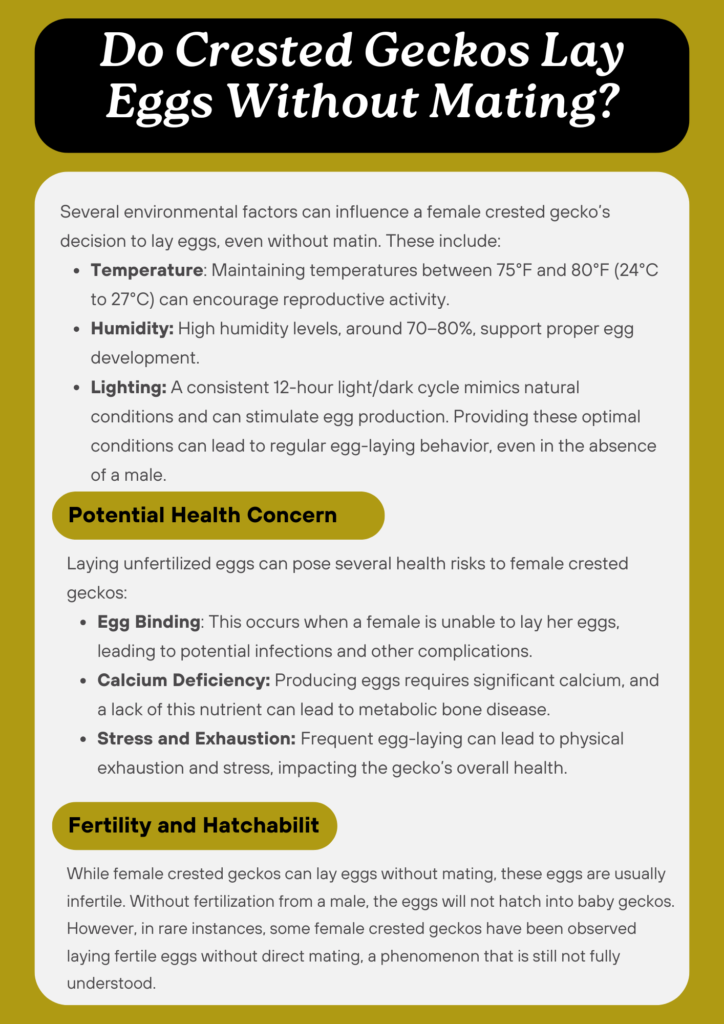If you’re a crested gecko owner—or considering becoming one—you might be curious about your pet’s reproductive habits. One common question is whether female crested geckos can lay eggs without mating. The answer is yes, they can. Female crested geckos possess the ability to produce eggs without the presence of a male, a process known as parthenogenesis. However, it’s important to note that these eggs are typically unfertilized and will not hatch into offspring. Understanding this aspect of their biology can help you better care for your gecko and manage expectations regarding egg-laying behavior.
What Is Parthenogenesis?
Parthenogenesis is a form of asexual reproduction where an embryo develops from an unfertilized egg. In crested geckos, this means that a female can lay eggs without mating with a male. These eggs, often referred to as “dud” eggs, are genetically identical to the mother and will not hatch into baby geckos. This reproductive strategy allows female geckos to reproduce even in the absence of males, ensuring the continuation of their species in certain environments.

Do Crested Geckos Lay Eggs Without Mating (Factors)
Several environmental factors can influence a female crested gecko’s decision to lay eggs, even without matin. These include:
- Temperature: Maintaining temperatures between 75°F and 80°F (24°C to 27°C) can encourage reproductive activity.
- Humidity: High humidity levels, around 70–80%, support proper egg development.
- Lighting: A consistent 12-hour light/dark cycle mimics natural conditions and can stimulate egg production. Providing these optimal conditions can lead to regular egg-laying behavior, even in the absence of a male.
Fertility and Hatchabilit
While female crested geckos can lay eggs without mating, these eggs are usually infertile. Without fertilization from a male, the eggs will not hatch into baby geckos. However, in rare instances, some female crested geckos have been observed laying fertile eggs without direct mating, a phenomenon that is still not fully understood.
Potential Health Concern
Laying unfertilized eggs can pose several health risks to female crested geckos:
- Egg Binding: This occurs when a female is unable to lay her eggs, leading to potential infections and other complications.
- Calcium Deficiency: Producing eggs requires significant calcium, and a lack of this nutrient can lead to metabolic bone disease.
- Stress and Exhaustion: Frequent egg-laying can lead to physical exhaustion and stress, impacting the gecko’s overall health.
To mitigate these risks, ensure your gecko has a balanced diet rich in calcium and vitamin D3, and provide a stress-free environment.
Managing a Female-Only Colony
If you’re keeping a female-only crested gecko colony, it’s essential to understand their reproductive behavior. While males aren’t present, females may still lay eggs due to their natural reproductive cycle. Providing adequate nutrition, proper environmental conditions, and monitoring for signs of health issues are crucial for the well-being of your geckos.
Final Thoughts
In conclusion, female crested geckos can lay eggs without mating, thanks to parthenogen. While these eggs are typically infertile, understanding this aspect of their biology can help you provide better care and manage expectations regarding egg-laying behavior. By maintaining optimal environmental conditions and ensuring proper nutrition, you can support the health and well-being of your crested gecko.

